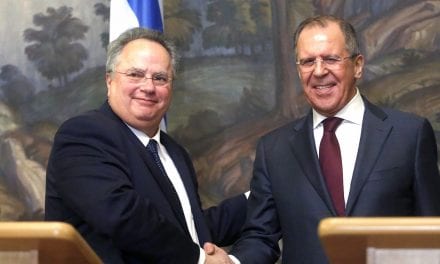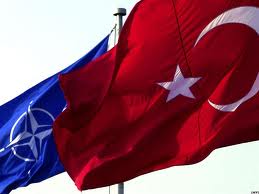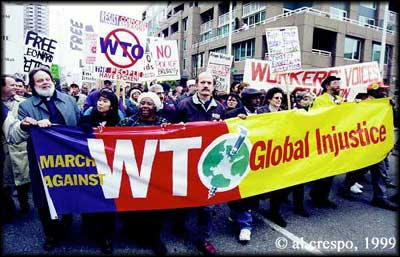Bretton Woods Project
The Troika has announced another Greek debt agreement, but disputes between the Fund and its Troika partners over debt reduction remain unresolved.
The announcement in late November of a deal amongst the Troika, comprising the IMF, European Central Bank (ECB) and European Commission (EC) (seeUpdate 82, 81, 80) to finance Greek debt obligations includes new funding, a buyback of privately-held bonds, an extension in the maturities of prior loans plus a deferral in interest payments on those loans, as well as a transfer of profits on Greek bonds bought by the ECB during the crisis.
The deal forces Greece to continue to conduct sweeping reforms to reduce spending, despite experiencing a 25 per cent fall in GDP over the last five years. Civil society organisations remain irate over the process and its outcome. Yiorgos Vassolos of NGO Corporate Europe Observatory said "parties in the governing coalition in Greece had promised before the elections a re-negotiation of the memoranda accompanying the loans. On the contrary, new devastating austerity measures have been imposed. The compromise was made without any Greek involvement." He added that "taxpayers' money from across the eurozone is committed to a new loan that cannot be paid back. €23.8 billion ($30.9 billion) from December's tranche will go directly toward re-capitalising banks. Greek pension funds will bear the burden of re-purchasing bonds. Revenues from privatisation and primary budget surpluses will be locked in a segregated account for debt servicing, demonstrating how colonial situations are created within the EU and democratic sovereignty is violated.''
In Spain, Portugal, Greece and Italy general strikes in mid November opposed increasing austerity and counter-productive reforms. Sectoral and company strikes occurred in non-euro area countries, including the Czech Republic, Romania and Slovenia, as well as France. Ronald Janssen, of the European Trade Union Confederation (ETUC), wrote on the day of the strikes that "rising public deficits functioned as the circuit breaker saving Europe in 2009/2010 from entering into a new Great Depression." He blames the so-called cure for exacerbating the crisis, arguing that, "by cutting public sector wages, jobs, investments and social expenditures member states have taken €300 billion to €400 billion of demand and purchasing power out of the economy in only two years."
Tensions in the Troika
IMF participation in the Troika has become increasingly fraught, with public disagreements amongst the partners over whether the Greek crisis can be resolved without creditors accepting a reduction in the value of their loans to Greece. The IMF has become increasingly public in its view that Greece's creditors (including eurozone states, such as Germany) will have to accept a debt write-down. In September, IMF managing director Christine Lagarde stated that "the Greek debt will have to be addressed", an opinion not shared by its Troika partners and Greek creditors who would prefer that Greece repays its debts in full, even if the terms of repayment are altered.
In Greece, unemployment is close to 23 per cent while wages and salaries have fallen by up to 30 per cent, according to a November study by Belgian think tank, Bruegel. The study anticipates Greek public debt exceeding 190 per cent of GDP, rather than the 167 per cent that was projected under Greece's prior assistance programme. Greece has had to agree to increasingly stringent budgets, the last of which the parliament narrowly passed in mid November. It entails €9.4 billion of cuts to salaries, pensions and social benefits, while raising the retirement age from 65 to 67, and increasing a range of taxes.
Greek default: efficient, fair and sensible?
Ashoka Mody, formerly deputy director of the Fund's research department, wrote in November that, for Greece, "it is time to revisit the default option", adding that this is "economically efficient, it is fair, and it is politically sensible." Former executive director of the Fund for India, Arvind Virmani, who only relinquished his position in October, told news agency AFP in November that "it has been my view since early 2010 that the Greek debt cannot be made sustainable without a drastic debt write-off … no matter what policy reforms the Greek government undertakes."
In September the managing director of the International Institute of Finance (a global association of private financial institutions), Charles Dallara, recommended interest rate reductions for Greece. In the same month Mohamed El-Erian, chief executive of US investment firm Pimco, called for outright debt write-downs. He wrote in the Financial Times that "without further debt reduction, Greece has little hope for restoring growth, jobs and, therefore, financial solvency." In El-Erian's view, write-downs of Greek loans are unavoidable and "the longer they wait … the greater the likelihood of an unplanned and badly managed debt reduction."
IMF: minority player?
The dispute between the IMF and its Troika partners over reducing Greece's debt crystallised in November when Lagarde disagreed with Jean-Claude Juncker, chair of the eurogroup of finance ministers, at a press conference. When Juncker stated that the reduction in Greek debt levels to 120 per cent of GDP should be achieved by 2022, Lagarde contradicted him: "the appropriate timetable is 120 per cent by 2020", adding "we clearly have different views".
The Troika deal accepted the higher figure of 124 per cent by 2020, though subsequent reports indicate that without additional measures the new deal will only limit debt to 126.6 per cent of Greek GDP. Though there is no explicit write-down of the nominal value of Greek debt, the host of measures constitutes an easing of the financial terms for Greece, and is projected to reduce Greek debt by 20 per cent of GDP immediately. Gavyn Davies, a fund manager writing in theFinancial Times, described the deal as "disguised Greek debt forgiveness." An accompanying analysis revealed that the further easing of financial terms that may be required by this deal would "almost certainly force losses on to eurozone creditors", a fact not acknowledged "because of the political cycle in Germany" according to a senior official.
The social movement Greek Debt Audit Campaign denounced the Troika decision, arguing that it "by no means solves the problem of public debt sustainability. Even by the Troika's own estimates, debt will approach 175 per cent of GDP in 2016, and will fall to 124 per cent after 2020. But it was at this level in 2009, before the whole 'stabilisation' packages started." Therefore, they believe that the deal "deepens rather than solves the fiscal crisis". Instead, they advocate "suspension of capital and interest payments … on sovereign state terms."
Though the deal has ostensibly released a €34.4 billion tranche of funding to Greece, the IMF's lending terms are unchanged and it intends to withhold its next disbursement until a private debt buyback, also agreed to as part of the new deal, is completed. Despite the focus of the Troika being to enable countries to return to borrowing directly from capital markets as soon as possible, its lending programmes are increasing, and not just in Greece. In November Cyprus became the fifth euro-area nation to request a loan since 2010.
The public disagreements have again raised questions as to whether the Fund's junior position in the Troika and the disproportionate influence of European states on its board has inhibited the IMF's ability to conduct its role objectively. The scale of IMF lending to Greece is unprecedented, equivalent to 3,751 per cent of its quota at the time of the loan, a measure used as a yardstick to gauge Fund commitment. Prior to the financial crisis, the previous record lending by the IMF according to this measure was 1,938 per cent to South Korea, in 1997. Ex-IMF official Charles Blitzer told the Financial Times in November that from the Fund's perspective, "if you're the minority player like in Greece right now, your leverage is de facto limited."



















